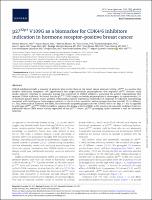| dc.contributor | Vall d'Hebron Barcelona Hospital Campus |
| dc.contributor.author | Mouron, Silvana |
| dc.contributor.author | Bueno, MJ |
| dc.contributor.author | Muñoz, Manuel |
| dc.contributor.author | Torres, Raul |
| dc.contributor.author | Rodriguez, Sandra |
| dc.contributor.author | Apala, Juan V. |
| dc.contributor.author | Malumbres Martinez, Marcos |
| dc.date.accessioned | 2023-04-25T06:35:33Z |
| dc.date.available | 2023-04-25T06:35:33Z |
| dc.date.issued | 2023-04 |
| dc.identifier.citation | Mouron S, Bueno MJ, Muñoz M, Torres R, Rodríguez S, Apala J V, et al. p27Kip1 V109G as a biomarker for CDK4/6 inhibitors indication in hormone receptor-positive breast cancer. JNCI Cancer Spectr. 2023 Apr;7(2):pkad014. |
| dc.identifier.issn | 2515-5091 |
| dc.identifier.uri | https://hdl.handle.net/11351/9407 |
| dc.description | Biomarker; Hormone receptor-positive; Breast cancer |
| dc.description.abstract | CDK4/6 inhibitors benefit a minority of patients who receive them in the breast cancer adjuvant setting. p27Kip1 is a protein that inhibits CDK/Cyclin complexes. We hypothesized that single-nucleotide polymorphisms that impaired p27Kip1 function could render patients refractory to endocrine therapy but responsive to CDK4/6 inhibitors, narrowing the patient subpopulation that requires CDK4/6 inhibitors. We found that the p27Kip1 V109G single-nucleotide polymorphism is homozygous in approximately 15% of hormone-positive breast cancer patients. Polymorphic patients experience rapid failure in response to endocrine monotherapy compared with wild-type or heterozygous patients in the first-line metastatic setting (progression-free survival: 92 vs 485 days, P < .001); when CDK4/6 inhibitors are added, the differences disappear (progression-free survival: 658 vs 761 days, P = .92). As opposed to wild-type p27Kip1, p27Kip1 V109G is unable to suppress the kinase activity of CDK4 in the presence of endocrine inhibitors; however, palbociclib blocks CDK4 kinase activity regardless of the p27Kip1 status. p27Kip1 genotyping could constitute a tool for treatment selection. |
| dc.language.iso | eng |
| dc.publisher | Oxford University Press |
| dc.relation.ispartofseries | JNCI Cancer Spectrum;7(2) |
| dc.rights | Attribution-NonCommercial 4.0 International |
| dc.rights.uri | http://creativecommons.org/licenses/by-nc/4.0/ |
| dc.source | Scientia |
| dc.subject | Mama - Càncer - Tractament |
| dc.subject | Proteïnes quinases - Inhibidors - Ús terapèutic |
| dc.subject.mesh | Breast Neoplasms |
| dc.subject.mesh | /drug therapy |
| dc.subject.mesh | Protein Kinase Inhibitors |
| dc.subject.mesh | /therapeutic use |
| dc.title | p27Kip1 V109G as a biomarker for CDK4/6 inhibitors indication in hormone receptor–positive breast cancer |
| dc.type | info:eu-repo/semantics/article |
| dc.identifier.doi | 10.1093/jncics/pkad014 |
| dc.subject.decs | neoplasias de la mama |
| dc.subject.decs | /farmacoterapia |
| dc.subject.decs | inhibidores de proteínas cinasas |
| dc.subject.decs | /uso terapéutico |
| dc.relation.publishversion | https://doi.org/10.1093/jncics/pkad014 |
| dc.type.version | info:eu-repo/semantics/publishedVersion |
| dc.audience | Professionals |
| dc.contributor.organismes | Institut Català de la Salut |
| dc.contributor.authoraffiliation | [Mouron S, Bueno MJ, Muñoz M, Apala JV] Breast Cancer Clinical Research Unit, Centro Nacional de Investigaciones Oncologicas—CNIO, Madrid, Spain. [Torres R, Rodríguez S] Molecular Cytogenetics Unit, Centro Nacional de Investigaciones Oncologicas—CNIO, Madrid, Spain. [Malumbres M] Cell Division & Cancer Group, Spanish National Cancer Research Centre (CNIO), Madrid, Spain. Cancer Cell Cycle group, Vall d’Hebron Institute of Oncology (VHIO), Barcelona, Spain. Institució Catalana de Recerca i Estudis Avançats (ICREA), Barcelona, Spain |
| dc.identifier.pmid | 36806942 |
| dc.identifier.wos | 000959320200004 |
| dc.rights.accessrights | info:eu-repo/semantics/openAccess |

 Private area
Private area Contact Us
Contact Us







